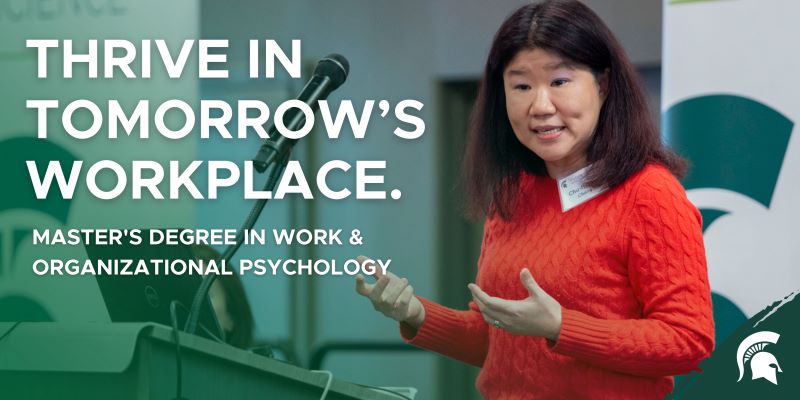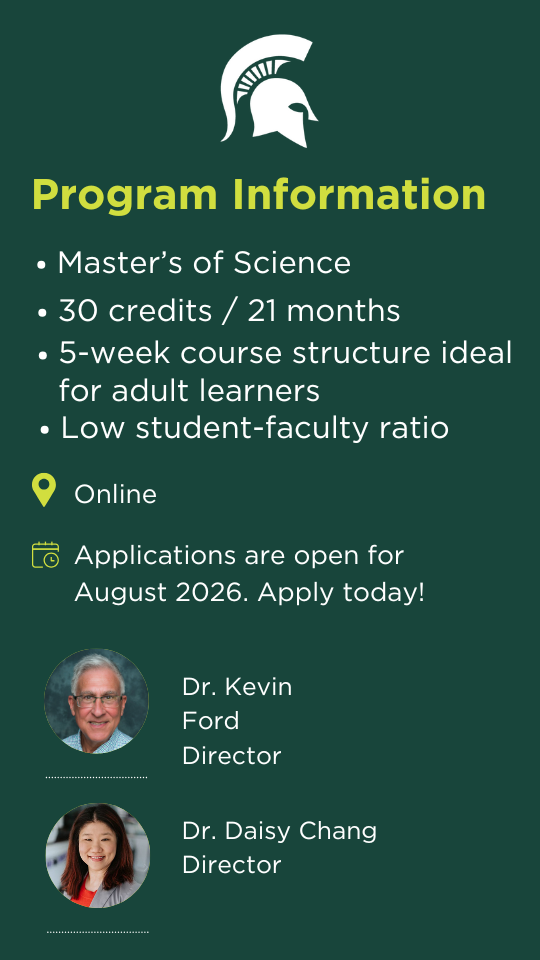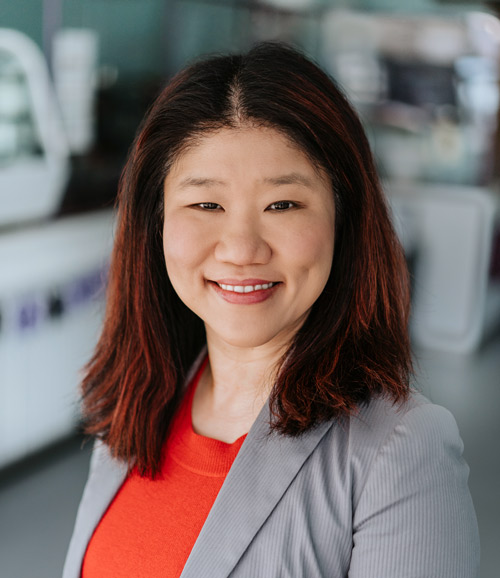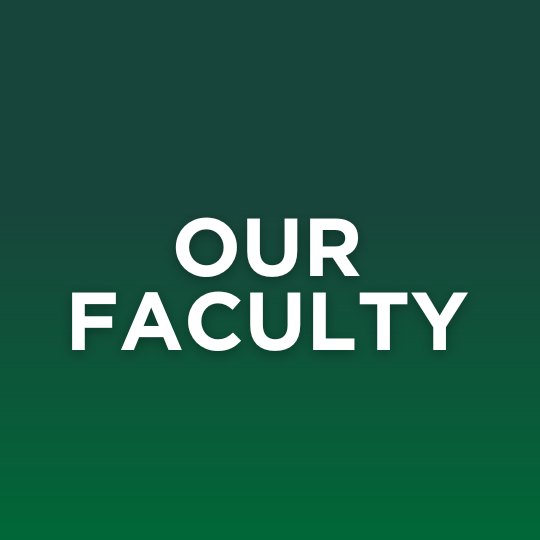Online Master's Degree in Work and Organizational Psychology

 In today's world, success demands more than book smarts - it requires practical skills, adaptability, and a forward-thinking mindset. Our program is designed to empower you with the tools, techniques, and insights needed to excel in the field of Industrial and Organizational Psychology.
In today's world, success demands more than book smarts - it requires practical skills, adaptability, and a forward-thinking mindset. Our program is designed to empower you with the tools, techniques, and insights needed to excel in the field of Industrial and Organizational Psychology.
The program is geared to working professionals who are looking to enhance their skill set for career development and advancement. We understand the unique needs of adult learners, and that's why we offer five-week courses that fit seamlessly into your busy lives. Our curriculum emphasizes hands-on learning, portfolio building projects, and learning from top experts in the field. You will hone your skills in talent assessment, survey design, data analysis, organizational management, and more, making you valuable to any organization.
With our Master's Degree in Work and Organizational Psychology, you'll graduate not with just a diploma but with the confidence and competence needed to drive positive change in the ever-evolving world of work.
Receive cutting-edge training critical for your success.
We conducted interviews with leading experts working in the areas of people analytics, talent management, and organizational and team effectiveness to identify critical competencies for a successful specialist in work and organizational psychology. Our curriculum is designed to build and strengthen your competencies in these areas.
Hands on learning for real world readiness.
Our master's program offers a unique advantage to you in the job market by providing practical, hands-on experience that develops skills relevant to solving real-world problems. One key aspect of our program is the emphasis on building valued quantitative and data analytic skills. Through practical coursework and projects, you will apply these skills to real-world scenarios, gaining invaluable experience that sets you apart from other job candidates. By creating a professional portfolio of your work throughout the program, you will demonstrate a readiness to tackle complex workplace challenges.
Learn from top experts in the field.
Our program instructors include leading experts in the field of work and organizational psychology who have been recognized for their work by numerous awards from the Society for Industrial and Organizational Psychology. Instructors consist of highly respected faculty members from Michigan State University's top-ranked doctoral program in organizational psychology. Alumni of the doctoral program, who are actively engaged in the field of work and organizational psychology, also serve as instructors. Thus, students will be informed by the rigorous scientific findings and evidence-based best practices.
I'm in the thick of this master’s program and really enjoying it. Strong faculty, thoughtful discussions, and coursework that’s practical and directly applicable to my current work and where I’m headed next. The cohort is exceptional bringing perspectives from across industries and sectors, which makes the learning even richer. I'm grateful for the experience.
Explore below to learn more:
-
Our Program at a Glance
- Master's of Science
- 30 credits / 21 months
- 5-week course structure ideal for adult learners
- $1,000 per credit hour
- Fully online
- Low student-faculty ratio
- Our focus is on hands-on learning, portfolio building projects, and learning directly from top experts in the field so you're ready to succeed in all workplaces.
- New cohorts start the third week of August each year.
- Applications for the August 2026 cohort are open! Applications will be evaluated as they come in.
-
Program Outcomes
In our Work and Organizational master's program, our educational goals are clear. One objective is to ensure you have a deep understanding of people issues at work, strategies for problem solving, and industry best practices. This knowledge is essential for anyone looking to excel in the dynamic field of organizational psychology.
Our second objective is to prepare you for success in a range of master's-level positions across various professional settings. Our program is about skill building for real-world readiness and ability to thrive in diverse environments.
We achieve these two goals through coursework and the completion of four capstone skill-building projects. The projects focus on talent assessment and validation, employee learning and development, benchmarking organizational practices, and survey design, implementation and analysis. These projects are directly relevant to duties performed as an Industrial and Organizational Psychologist and provide you with a portfolio to demonstrate your expertise in these areas.
-
Our Model and Values
The MS program is structured around two innovative components. First, rather than the typical academic model of semester long courses, each of our courses is five weeks in duration. You will take only one course at a time so you can concentrate on the course materials and assignments. This innovative approach will allow you to take three 5-week classes within the traditional academic semester.
Secondly, learning and application of knowledge and skills gained requires a team effort among the faculty and the students in the program. Therefore, a foundation for our program is the creation of a cohort model where students enter and complete the program together as a learning team. The cohort model also allows the program directors to coordinate the courses and monitor the progress of the cohort to aid in accelerating learning and development. A new cohort starts the third week of August each year. For each cohort the time to completion is less than two years (22 months).
In addition, be assured that embedded into every aspect of our program are the values of collaboration, truth, integrity, and diversity. In this program, you can expect an education that goes beyond traditional academic boundaries. We aim to not only equip you with practical skills but also nurture your intellectual curiosity, social responsibility, and creativity. By embracing discovery and staying ahead of industry trends, we will prepare you for the challenges of tomorrow.
-
Career Impact
Based on the most recent employment and salary survey of the Society for Industrial-Organizational Psychology, those who recently received their master’s degree had a median salary of $65,000, which increased significantly as they accumulated more work experiences (e.g., $87,500 for those 2-4 years after degree completion, and $99,174 for those 5-9 years after degree completion). Clearly, individuals with a master’s degree in work and organizational psychology have skillsets that are highly desirable in the labor market.
Job titles for recent graduates of those with a master’s degree may include specialist, consultant, and senior consultant. As individuals accumulate experience in this field, they may move into positions with titles such as Human Resources Manager, Director, Vice President in Human Resources, and Senior Vice President in Human Resources.
-
Admission Requirements
Application to the M.S. in Work and Organizational Psychology requires the following items:
- Official copies of transcripts from each institution attended. Must include a transcript for a bachelor's degree from an accredited college or university.
- A minimum of three (3) letters of recommendation from academic or professional contacts who can attest to your potential for success in this graduate program. Letters of recommendation can be requested from a variety of different recommenders to provide support for your motivation to pursue this degree, and/or your capabilities and other characteristics related to successfully completing this degree. For example, recommenders can be your faculty members/advisors from your undergraduate program (or your most recent degree program) who can provide information about you beyond the data conveyed through the course grade. They can also be your current and/or past work supervisors or coworkers who know you well.
- A personal statement addressing the following: your personal reasons for your interest in Work and Organizational psychology; related work experience; how an M.S. will help you attain your career goals; personal attributes that will be an asset to a career in Work and Organizational Psychology; personal qualities or experiences that will help you succeed in and complete an online degree program; and why you are seeking a graduate degree in Work and Organizational Psychology. Statements should be no more than 3 pages.
- Your resume or curriculum vitae.
- Non-US Citizens without permanent residency status: English proficiency exam (i.e. TOEFL or IELTS). Refer to the MSU Office of Admissions and the MSU Graduate School for further.
Please note that GRE scores are NOT required.
Questions about the application process can be directed to program coordinator Darlene Dalessandro.
-
Apply for Admission
How do I apply?
Applications for the August 2026 cohort are open! Applications will be evaluated as they come in.
- Complete the online application
Go to the MSU Office of Admissions Application Management website to complete the online admissions application for the graduate degree. A nonrefundable application fee is required.
In the online application, there is space to upload a "personal statement". Your written statement should address each of the items listed in the "What are the requirements" section above.
There is also space in the online application to provide contact information for your three recommendation letter writers. You just need to make sure you have their consent, names and email addresses. Once you submit the application, your letter writers will receive an email with instructions for submitting their letters through the online system.
The online application is also where you'll submit your resume or CV. You will be given a link once the application fee is paid and submitted.
To return to an application you started, go to https://explore.msu.edu/apply/. - Request your transcripts
Request official transcripts from each institution attended. The official transcripts MUST be sent by the appropriate officials from each institution directly to the university. See the instructions below for sending transcripts. Your application is not complete until we receive your official .
Transcripts from U.S. Institutions
Electronic transcripts are preferred and can be sent directly to Michigan State University admissions. If you are required to input an email, send to: workorgpsy@msu.edu. If electronic transcripts are not an option, have paper copies sent to the following address: Work and Organizational Psychology Graduate Program, Department of Psychology, 316 Physics Road Rm 262, Michigan State University, East Lansing, MI 48824.
International Transcripts
All international academic records need to be mailed by the institutions attended in official, sealed envelopes to the following address: Michigan State University, Office of Admissions, 426 Auditorium Dr East Lansing, MI 48824.
Records must show courses taken, grades earned and must be translated into English if the original records are in another language. Translations must be done by the issuing institution, a certified translator in the country of study, or by an American Translator’s Association certified translator in the US. The original record should be also included.
More information for international applicants can be found here: https://grad.msu.edu/internationalapplicants - Request English language proficiency test scores (for non-US Citizens without permanent residency status)
Have English language proficiency test scores (TOEFL or IELTS) electronically sent to the MSU Office of Admissions directly from the testing agency. MSU's TOEFL code is 1465. Also, review MSU's international requirements here: MSU Admissions for International Students. Do NOT have testing reports mailed to the university or Department of Psychology.
When is the application deadline?
Applications are evaluated once the application is submitted, and all required information (e.g., letters of recommendation, transcripts) is obtained. Notice of acceptance will normally be within one month after all the required information is obtained. The final application deadline for consideration for the August start date is June 30th of each year.
What happens after I submit my application?
Admission to the M.S. in Work and Organizational Psychology requires a three-step review process:
- The admission committee reviews the applicant's materials. The committee's recommendation (accept or deny) is forwarded to the MSU College of Social Science for review.
- The MSU College of Social Science reviews the application and forwards their recommendation (admit or deny) to the MSU Office of Admissions.
- The MSU Office of Admission reviews the applicant's credentials and makes an official admission decision.
Typically, the application review/admission process takes approximately 2 to 4 weeks, and you will receive system-generated updates as your application packet move from the department to college and the admission office. All applicants receive a final decision letter by email.
Questions about the application process can be directed to program coordinator Darlene Dalessandro.
- Complete the online application
-
Financial Aid Eligibility
The program has been approved and is eligible for federal student loans. In addition, private loans and MSU scholarships are available to qualified graduate students. For more information, please see the Office of Financial Aid at MSU (https://finaid.msu.edu/grad).
-
Course List
All students must complete 30 credits with a 3.0 minimum cumulative grade-point average.
Required Courses. All students must complete the following nine courses (18 credits total):
PSY 806 Consulting Roles and Professional Development (2 credits)
PSY 807 Quantitative Analysis I (2 credits)
PSY 808 Quantitative Analysis II (2 credits)
PSY 816 Current Topics in Work and Organizational Psychology (2 credits)
PSY 819 Test and Measurement Development (2 credits)
PSY 821 Staffing Organizations (2 credits)
PSY 822 Performance Management (2 credits)
PSY 823 Workplace Learning and Development (2 credits)
PSY 824 Employee Attitudes and Engagement (2 credits)
Required Practicum Experiences: All students must complete four practicum courses (8 credits total)
PSY 856 Practicum I: Making the Business Case (2 credits)
PSY 857 Practicum 2: Applied Skills in Data Analysis and Interpretation (2 credits)
PSY 858 Practicum 3: Developing a Training and Onboarding Program (2 credits)
PSY 859 Practicum 4: Attitude Survey Development and Analysis (2 credits)
Special Students complete 2 Special Topics seminars to meet the minimum requirement of 30 credits (4 credits total)
PSY 830 Special Topics (2 courses – two credits each)
-
Meet the Directors

Meet Dr. Kevin Ford.
I am a professor of Psychology at Michigan State University whose major focus is on workplace learning and development and organizational change. My consulting work includes working with various private and public sectors on training, leadership, strategic planning and organizational development issues.
As a researcher, I have published over 100 articles and chapters and six books including my recent textbook on “Learning in Organization: An Evidence-Based Approach”. My contribution to the field has been recognized by my election as Fellow of the Society of Industrial and Organizational Psychology (SIOP) and I recently received the Scientist-Practitioner Award from SIOP.
My BS in psychology is from the University of Maryland and my MA and Ph.D. in psychology is from The Ohio State University.
Learn more about Dr. Ford here.

Meet Dr. Daisy Chang.
In my research, I strive to improve employee health, well-being, and safety by enhancing our understanding of the socio-cognitive and motivational processes that influence behaviors in organizational settings. I am particularly interested in identifying psychological processes that not only account for behavioral criteria that have been the traditional focus of industrial and organizational psychology, but also criteria related to occupational health and safety.
Explore more here:




